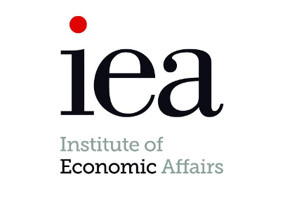Well, well – our new minister for civil society, Lord Kamall, is a past research director of the Institute of Economic Affairs (IEA). This is a humble example of the reach of that contentious charity into the new government.
For, as George Monbiot described in a recent Guardian column, Liz Truss was a founder member of the Free Enterprise Group of Conservative MPs, whose webpage was registered by Ruth Porter, communications director of the IEA, and for whom the IEA organised events and supplied media briefings. 12 members of the Free Enterprise Group are now in the Cabinet, and Ruth Porter is Truss's new deputy chief of staff at No 10.
Moreover, two out of three of Truss's chief economic advisers during her campaign were from the IEA stable: Patrick Minford, a long serving board member, and Julian Jessop, former IEA chief economist and economics fellow. The director of the IEA Mark Littlewood has given interviews about “his friend” Liz Truss and her incorruptible free market credentials, and Truss has held more meetings with the IEA over the past 12 years than any other politician.
Is this a triumph for charity sector influence on government policy, you may ask? No, because the IEA should not be a charity at all, for two reasons. Firstly, the IEA's project is inherently political, in the sense of the Charity Commission's definition in CC9 (this is not the same as party political, though the IEA sails very close to the wind on that criterion also). Secondly, although it claims the advancement of education as its purpose, it constantly infringes the Commission's own definition of what charitable education must be.
It is a regulatory failure of the Commission over years to have repeatedly rapped the IEA's knuckles for individual breaches of its guidance without being courageous enough to recognise that these are but symptoms of the fundamentally political and evangelical, proselytising nature of the IEA, which exists to promote free market ideology and shrink the state.
‘Political’ activity
Here is the Charity Commission's definition of “political” activity, which by law must not be part of a charity's purpose: “aimed at securing, or opposing, any change in the law or in the policy or decisions of central government, local authorities or other public bodies, whether in this country or abroad”. (CC9 says you can engage in political activity in support of an exclusively charitable purpose, such as the relief of poverty, protection of the environment etc, but political activity must not be the purpose.)
And here is the IEA's own description of its purpose: “It is more vital than ever that we promote the intellectual case for a free economy, low taxes, freedom in education, health and welfare, and lower levels of regulation”. “[All those involved in the IEA] believe that society's problems and challenges are best dealt with by individuals, companies and voluntary associations inter-acting with each other freely without interference from politicians and the state. This means that government action, whether through taxes, regulation or the legal system, should be kept to a minimum. Our authors and speakers are therefore always on the look-out for ways of reducing the government's role in our lives.”
It is obvious that such a purpose necessarily involves “changes in the law, policy or decisions” of government and other public bodies. So how can the Commission possibly accept that the purpose of the IEA is exclusively charitable and not political?
Moreover, the supposed charitable purpose of the IEA is the advancement of education. Here are some salient quotations from the Commission's guidance on what charitable education must mean:
“Promoting a specific point of view may be a way of furthering another charitable aim, but it would not be education.”
“[Charitable education involves] researching and presenting information in a neutral and balanced way that encourages awareness of different points of view where appropriate.”
“Advancement of education by a charity must not be promoting a predetermined and controversial position.”
Playing by the rules
The entire output of the IEA is designed to promote the specific, predetermined and controversial point of view already summarised from their website. “Neutral and balanced” is a different universe.
Thus, part of the very purpose of the IEA – shrinking the state – is political, and their version of “education” is promoting a predetermined and controversial point of view and cannot be charitable education.
There are plenty of charitable think tanks for the advancement of education that play by the rules. There are plenty of non-charitable think tanks that promote a controversial, predetermined point of view without pretending to be charitable. It is unjust to both of these that the IEA should not play by the rules, and yet enjoy the status and financial benefits of being a charity. There is a lazy argument doing the rounds that people only criticise the think tanks with which they disagree and if you deprive one of charity status the rest would all go down like ninepins too. That is nonsense. Each case must be looked at on its merits in the light of the Commission's own, clear guidance.
Charity Commission board members: please look at yourselves in the mirror and see if you can truthfully say: “The IEA's purpose is in no way political as defined in CC9. Its education and research is balanced and neutral and does not promote a predetermined and controversial point of view.” If you can't, it is surely time to act.
Andrew Purkis is a charity trustee and has been chair or vice chair of eight UK charities, chief executive of others and was a board member of the Charity Commission from 2006 to 2010
IEA response
Andy Mayer, chief operating officer and company secretary of the IEA, said: “Andrew Purkis’s latest attack on the Institute of Economic Affairs (IEA), would be more compelling had he not already tested the points he raises with the regulator, repetitively, over the course of a decade long lobbying campaign. He honourably maps out this record of failure on his own blog, but persists in pretending this is a live issue, rather than one long settled by regulatory review.
“Charities can be political in line with their mission, provided that is not their sole purpose, and self-evidently isn’t at the IEA which runs summer schools, publishes books, and other educational content. Education charities must in addition be ‘sufficiently balanced and neutral’, but ‘within the school of thought’ and ‘in the round’ while allowing readers or listeners ‘to reach their own conclusions’. Meaning we offer a range of free market content, balance should be considered in the wider context of that output, and we offer options not campaigns.
“Whether education charities can be controversial remains controversial. We believe such a stipulation does not exist in charity law, and clearly conflicts both with freedom of expression and academic freedom as defined in the education acts. Whether the regulator now agrees is unclear. It is, though, self-evidently relevant to their reversal of the regulatory sanction misapplied to the IEA in 2019 when they banned and then unbanned a book about Brexit.
“Funding transparency or protection of donor privacy is a matter of general charity law, not specific to think tanks. Were any think tanks selling access to ministers for lobbying purposes this would be strictly illegal in both charity and lobbying law. Claims in this area usually amount to conspiratorial and abusive online campaigns, that do not encourage transparency. A specific allegation made against the IEA in 2019 was tested and found without merit by two regulators. We have conversely published on improving transparency by requiring all politicians to publish their meetings.
“But in simple terms, while Purkis is a knowledgeable and experienced charity law campaigner, on the matter of the IEA’s charitable status he is simply and repetitively wrong, and has been told so repeatedly by the regulator.”
Charity Commission response
A Charity Commission spokesperson said: “All charities, which include think tanks registered with the Commission, must operate in line with their duties.
“If complaints or concerns are raised with us we will assess those against our published regulatory framework and if needed take regulatory action as appropriate.”
Related Articles











